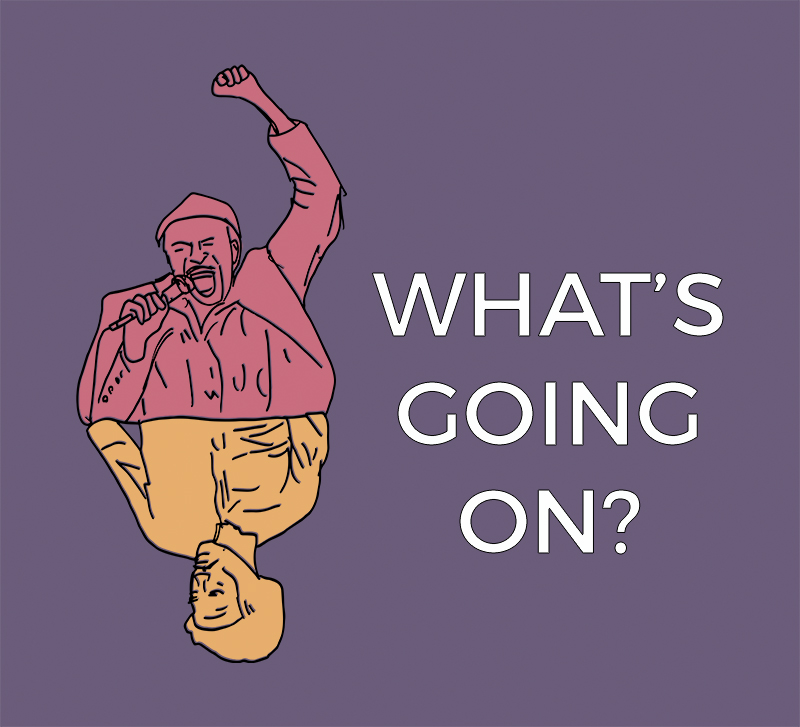A look back at the politically-charged masterpiece that remains relevant to this day
Marvin Gaye is mostly known for his smooth and sexy songs. Due to his sultry and powerful voice, Gaye’s ability to portray sensuality is unmatchable. The instrumentation backing his tracks is always grand and lush. “Let’s Get it On” has soundtracked countless movies and is cliched to the point of parody. Joints like “Sexual Healing,” on the other hand, emphasize the restorative powers, physically and spiritually, of sex. However, arguably, his most seminal album, What’s Going On (1971), has nothing to do with sensuality.
During the late 60s and early 70s, the world was rife with political and social struggle. At the same time, people were becoming more conscious about historical injustices and encouraging many to join movements trying to subvert government monoliths. At the peak of the Vietnam war, the idealistic hippie movement became overshadowed by Richard Nixon’s presidency—and his “Southern strategy,” which targeted white southerners as a way to counteract black voters, who were shifting to the Democratic party. As the world was embroiled in endless political unrest, Gaye released What’s Going On, an album that remains relevant in contemporary culture and political landscapes to this day.
According to NPR, the album was inspired by Gaye’s brother, Frankie, returning from Vietnam. During Frankie’s service in the war, his worldview changed. Gaye decided to write the whole album from his brother’s point of view. The album never becomes disingenuous or trite, but skillfully deals with themes of political discontent, drug abuse, poverty and ecological destruction. Musically, the album’s tracks flow seamlessly from one to the next, highlighting Gaye’s connection to minority communities.
According to CBC Music, the album was released under the Motown label and was its biggest success in terms of sales. While it was initially seen as risky, the album received critical acclaim and mainstream popularity. It’s important to highlight the album’s success, because it exposed many people to the profound perspective of living in black America.
In “What’s Happening Brother,” Gaye contrasts the supposed progress America has made, singing: “Are things really gettin’ better, like the newspaper said / Can’t find no work, can’t find no job my friend / Money is tighter than it’s ever been / Say man, I just don’t understand / What’s going on across this land.” The track astutely illustrates the disparity between people’s experiences and the ideal of what society “should” be. Then, the album transitions smoothly into the next song.
On “Flyin’ High (In the Friendly Sky)” Gaye explores the pain of drug addiction and the broken psyche of an addict. He sings: “Nobody really understands, no no / And I go to the place where the good feelin’ awaits me / Self destruction in my hand.” Gaye analyzed an aspect of drug use rarely explored at the time: isolation. Soldiers came back from Vietnam physically and mentally wounded, lacking adequate support from the government. This is the case for marginalized war veterans; not many people can understand the trauma of war and the difficulties that come with re-assimilating into civilian life. Some resort to drugs as a vehicle of escape.
“God Is Love” is a short but sweet interlude to the more thematically dense tracks. The instrumentation on this track is smooth and energetic, while the strings and the polished piano sound supplement Gaye’s expressive voice. Gaye’s spirituality can really be felt in this track. It seems like a genuine belief and not an idealistic plea for religion. The track fluidly transitions into “Mercy Mercy Me (The Ecology).”
This track is one of the most predictive cuts off the album. It focuses on climate change during an era when very few artists knew about this issue. Gaye laments the environmental ravages of his modern era: the poisonous winds, our oil-polluted seas, the extinct animals and the overcrowded cities. Instrumentally, the track has a beautiful tenor saxophone lead and swelling strings. Again, Gaye’s vocals are impassioned. The performance evokes an authentic grief about the state of our environment.
Unfortunately, the aforementioned problems detailed in the album have deep historical roots—problems that people still face today. On “Inner City Blues (Make Me Wanna Holler),” Gaye sings about systemic oppression and its constricting effects on marginalized communities, specifically black communities. Lines like: “Money, we make it / Fore we see it you take it / Oh, make you wanna holler / The way they do my life” and “Crime is increasing / Trigger happy policing / Panic is spreading / God knows where” are still relevant today.
Many think we live in a particularly unique and challenging time, given the recent rise of ultra-conservative movements and power-hungry politicians. Historically, systematically oppressed people have never benefited from the powers-that-be, but rather suffered under the power of others. Black people and other minorities have experienced brutality, suffering and injustice since the advent of the United States and Canada. Those lived experiences and struggles have been emphatically and systematically ignored by the privileged mainstream news media for years.
Gaye’s album is a dense, breathtaking journey that is as pop accessible as it is artistically poignant. What’s Going On doesn’t preach and never delves into the pompous side of politically-charged music. It’s an account of shared experiences that many people can relate to. Albums like Kendrick Lamar’s To Pimp a Butterfly (2015) and its striking political clarity can be traced back to this album. What’s Going On still remains an essential masterpiece and a potent reminder of long-standing struggles.
Graphic by Zeze Le Lin




